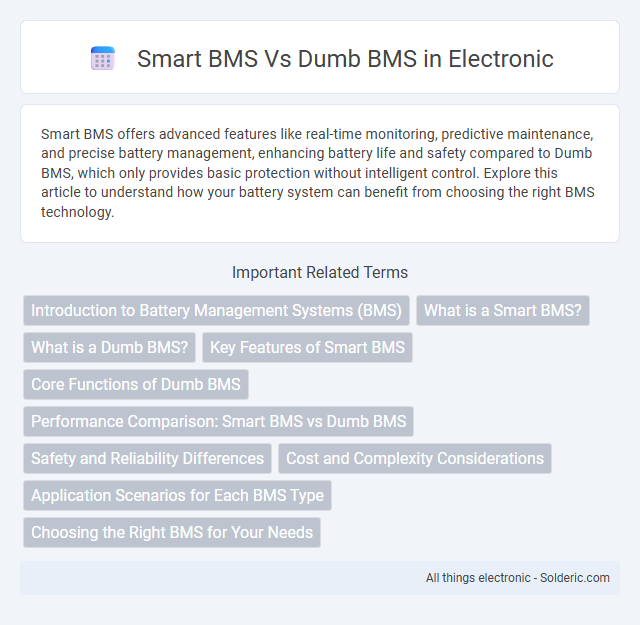Smart BMS offers advanced features like real-time monitoring, predictive maintenance, and precise battery management, enhancing battery life and safety compared to Dumb BMS, which only provides basic protection without intelligent control. Explore this article to understand how your battery system can benefit from choosing the right BMS technology.
Comparison Table
| Feature | Smart BMS | Dumb BMS |
|---|---|---|
| Battery Monitoring | Real-time cell voltage, temperature, and current monitoring | Basic voltage and temperature detection |
| Battery Protection | Advanced protections with customizable thresholds | Simple overcharge and discharge protection only |
| Communication | Supports CAN, SMBus, UART, Bluetooth for remote monitoring | No or minimal communication capabilities |
| Energy Management | Optimizes battery usage and lifespan via smart algorithms | No energy optimization features |
| Scalability | Easily scalable for large battery packs and complex systems | Limited scalability, mainly for small, simple packs |
| Cost | Higher initial investment due to advanced hardware/software | Lower cost, simpler design |
| Use Cases | Electric vehicles, grid storage, smart energy systems | Small electronics, basic battery packs |
Introduction to Battery Management Systems (BMS)
Battery Management Systems (BMS) are essential for monitoring and protecting lithium-ion batteries by managing voltage, temperature, and current to ensure optimal performance and safety. A Smart BMS incorporates advanced features such as state-of-charge estimation, balancing algorithms, and real-time data communication, enabling improved battery longevity and efficiency. Understanding the difference between Smart and Dumb BMS helps you choose the right system to safeguard your battery investment and optimize its operation.
What is a Smart BMS?
A Smart BMS (Battery Management System) actively monitors and manages individual battery cells' voltage, temperature, and state of charge to optimize performance and lifespan. Unlike a Dumb BMS, which only provides basic protection like overcharge and discharge cutoff, a Smart BMS uses advanced algorithms and communication protocols to balance cells and provide real-time data via apps or interfaces. Your battery system benefits from enhanced safety, efficiency, and diagnostics with a Smart BMS integrated into its management.
What is a Dumb BMS?
A Dumb BMS, or basic Battery Management System, primarily monitors battery parameters such as voltage and temperature without advanced communication or control capabilities. It lacks intelligent features like real-time data analytics, adaptive balancing, and integration with external systems, resulting in limited battery optimization and protection. Compared to a Smart BMS, a Dumb BMS provides minimal functionality and is often used in simpler or cost-sensitive battery applications.
Key Features of Smart BMS
Smart BMS integrates advanced battery monitoring with real-time data analytics, balancing cell voltages to enhance battery life and safety. It offers features like state-of-charge estimation, temperature regulation, fault detection, and communication interfaces for seamless integration with other systems. Your battery system benefits from optimized performance and extended lifespan through intelligent monitoring and control.
Core Functions of Dumb BMS
Dumb BMS primarily handles basic battery protection functions such as overvoltage, undervoltage, and overcurrent cutoffs without advanced data processing or communication capabilities. It lacks features like cell balancing, state of charge estimation, and thermal management, which are essential for optimizing battery performance and lifespan. Designed for simple safety monitoring, Dumb BMS systems operate with limited intelligence, providing minimal control over battery health and efficiency.
Performance Comparison: Smart BMS vs Dumb BMS
Smart Battery Management Systems (BMS) provide enhanced performance by continuously monitoring individual cell voltages, temperatures, and state of charge, ensuring optimal battery health and longevity compared to Dumb BMS, which offer basic protection without cell-level insights. The advanced algorithms in Smart BMS enable precise balancing and predictive maintenance, reducing risks of overcharging and thermal runaway, whereas Dumb BMS typically rely on simple threshold-based protection mechanisms. Consequently, Smart BMS deliver higher efficiency, improved safety, and extended battery lifecycle, making them superior for complex battery systems in electric vehicles and renewable energy storage.
Safety and Reliability Differences
Smart BMS incorporates real-time monitoring, fault detection, and automated balancing, significantly enhancing safety and reliability compared to Dumb BMS, which lacks these advanced features. Your battery system benefits from Smart BMS's ability to prevent overcharge, over-discharge, and overheating, reducing the risk of failure and extending battery lifespan. Dumb BMS relies on basic protection circuits and manual maintenance, making it less effective in managing battery health and responding to anomalies.
Cost and Complexity Considerations
Smart BMS offers advanced monitoring features and precise battery management, resulting in higher upfront costs and increased system complexity compared to Dumb BMS, which provides basic protection at a lower price point. Your choice depends on the need for real-time data analysis and fault detection versus budget constraints and simpler battery setups. Cost-effective solutions may favor Dumb BMS for basic applications, while Smart BMS justifies investment in larger, performance-critical battery systems.
Application Scenarios for Each BMS Type
Smart BMS excels in complex applications like electric vehicles, renewable energy systems, and large-scale battery storage, where real-time monitoring, advanced diagnostics, and adaptive control are crucial for maintaining battery health and safety. Dumb BMS suits simpler, cost-sensitive scenarios such as basic consumer electronics or small backup power systems, where minimal monitoring and protection is sufficient. Understanding your application's complexity and performance requirements ensures you choose the optimal BMS to maximize battery efficiency and lifespan.
Choosing the Right BMS for Your Needs
Smart BMS systems offer advanced features like real-time monitoring, adaptive balancing, and remote diagnostics, making them ideal for users seeking optimized battery performance and longevity. Dumb BMS solutions provide basic protection and simple functionality, suitable for cost-sensitive applications with less complex battery requirements. Evaluating your energy management needs and system complexity helps determine whether a Smart or Dumb BMS aligns best with your battery setup.
Smart BMS vs Dumb BMS Infographic

 solderic.com
solderic.com